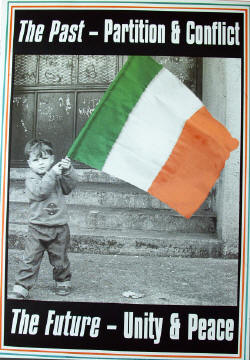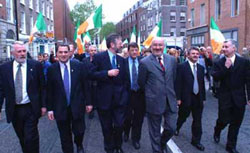 |
Irisch
Republikanische Solidarität
|
 |
ESTABLISHMENT ROCKED BY COLLUSION REPORT
The confirmation by a senior British police officer that British
forces in Ireland colluded with unionist paramilitaries in the
murder of nationalists has had a dramatic impact on the
mainstream media over the Easter weekend.
Headlines, articles and editorials have expressed shock and
outrage at the brief interim summary report of London police
chief John Stevens.
The families of victims, such as defence lawyer Pat Finucane,
welcomed the sudden end to an unofficial censorship about the
killings. For the majority of nationalists and republicans,
however, the report was too little, too late -- the conclusions
were limited and the small summary which was made public
contained no new information.
Nationalist political representatives described the Stevens
report as "the tip of the iceberg" and joined human rights
organisations in calling for the British government to redress
the injustice with an open, public judicial inquiry.
In the face of naked hostility from within the forces in
question, Stevens took an astonishing 14 years to compile his
report. He reported that during the course of three inquiries he
had experienced "cultural" obstruction throughout the British
army and the RUC police in the Six Counties.
Stevens found that secret co-operation by the RUC's Special
Branch and British military intelligence included "collusion in
both murders and the circumstances surrounding them".
"Collusion is evidenced in many ways," he wrote. "This
ranges
from the wilful failure to keep records, the absence of
accountability, the withholding of intelligence and evidence,
through to the extreme of agents being involved in murder."
Stevens looked into the murders of Pat Finucane and Brian Adam
Lambert -- a Protestant youth killed in error -- and concluded
that their deaths "could have been prevented".
The burning of his own inquiry room, near Belfast, had never been
adequately investigated, he said, and he concluded the fire had
resulted from an arson attack.
But after 18 years of investigation, the absence of a single
criminal prosecution and the withholding of all of the details of
the Stevens report came a serious disappointment. The Director of
Public Prosecutions has still not received a single
recommendation for prosecution or any files on guilty members of
the RUC/PSNI.
There was also considerable scepticism over the report's
recommendations on administrative reform for a police force which
still harbours an unknown number of participants in the murderous
conspiracy.
The families of some of those whose loved ones were killed in the
controversial killings were angry when they were barred from
Stevens' press conference in Belfast on Thursday. One woman was
dragged away from the room.
Mr Mark Thompson of Relatives for Justice said: "It is an
absolute disgrace that the families who have been bereaved and
who are being discussed in this report have been excluded.
"It is bad enough that only around 20 pages of this document is
being published without us having to ensure this sort of
treatment." The families were later given access to detectives
from the Stevens Inquiry but they said their request to meet John
Stevens himself was denied.
Pat Finucane's widow Geraldine said that her family's call for an
independent inquiry has been about revealing the bosses who
ordered the killings: "Well certainly I would like to see them
being brought to justice but throughout this whole period of time
they have never been my primary motive for furthering this case
and for moving along.
"I have always been more interested in the people behind the
scenes.
"The ones who sent these guys out, the ones who encouraged them
to go and the ones who watched while they did it, watched while
they got rid of their weapons afterwards and still did nothing
about it."
The widely-held belief that a culture of collusion continues to
this day was not addressed by the Stevens inquiry. That belief
was underlined by news that members of the Sinn Fein security
team were recently visited and told that their personal details
had fallen into the hands of unionist paramilitaries.
Speaking at an Easter commemoration in County Tyrone on Sunday,
Sinn Fein's Martin McGuinness said highly important questions
were now "at long last" being raised about the activities of
those responsible for the murders of nationalists: "Who
authorised this strategy? Who at the highest levels of the
British government was aware that was happening? Who funded these
activities? Who were they accountable to and critically, how
widespread was it?"
A comment by Policing Board vice-chairman Denis Bradley that a
public inquiry may not be the best way to uncover the full truth
drew strong criticism from nationalists, who accused him of
seeking to protect the PSNI.
Meanwhile, Ulster Unionist leader David Trimble rejected demands
for a public inquiry and said the British Parliamentary
Intelligence Committee, which meets in private, should carry out
another investigation.
"The last thing we want is another full judicial inquiry when we
see what is happening in terms of the time and money that has
been expended elsewhere," he said.
Sinn Fein President Gerry Adams pointed out that the timing of
the Stevens' appeared timed to minimse the embarrassment to the
British government.
"Imagine in any other place in the world, imagine the uproar
there would be in Parliament," he said. "Here they put out the
report (the day) after the Parliamentary recess."
He said that when Sinn Fein had first raised the issue of the
British policy of collusion in the late 1980's, the party was "a
lone voice" along with the families of those killed. It had
brought the issue up in the negotiations, as recently as last
week, and presented a dossier to the British Prime Minister.
"This was about more than simply passing on information," he
said. "This was about the deliberate targeting and assassination
of citizens. Many of these people were members of my party. It
was an attempt to intimidate and brutalise an entire community.
In any other country this would bring a government to its knees."
"The limited publication of this Stevens Report is only the tip
of the iceberg," said Mr Adams. "It is by no means the end of
the
matter. Sinn Fein will continue to support the demands of the
families for a full public judicial inquiry into the policy of
collusion."
Letzte Änderung:
06-Sept-03